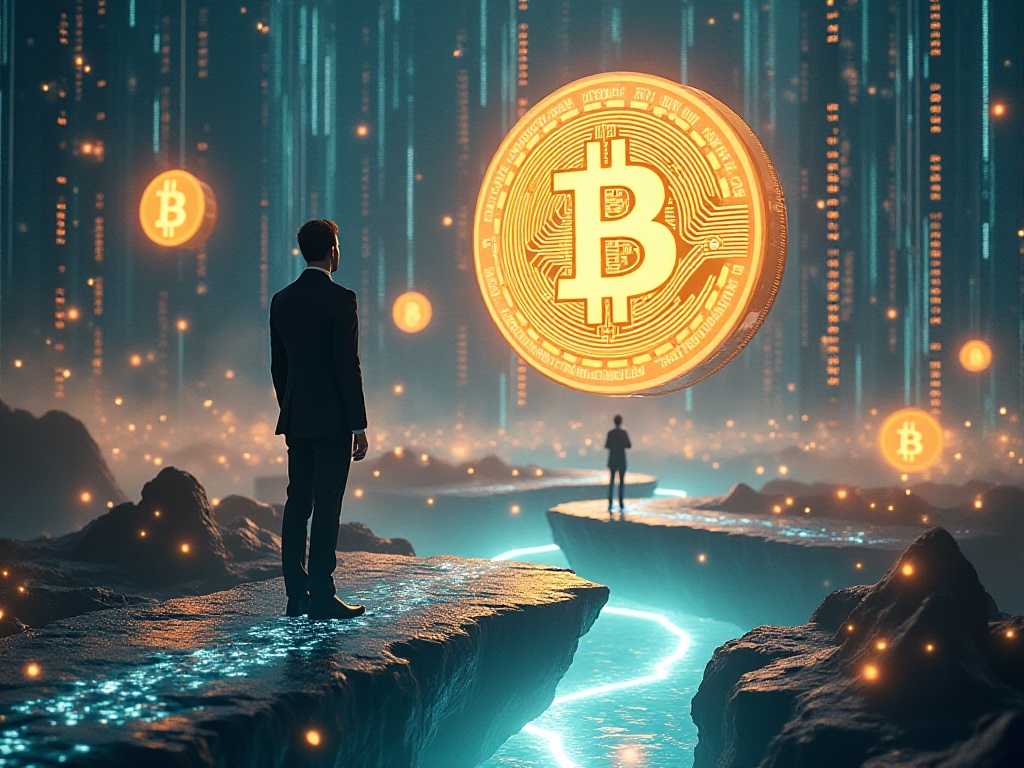

Opening Thoughts
Hello everyone! Today I want to share a fascinating topic - cryptocurrency wallets. As someone who has been in the blockchain space since 2017, I've witnessed the evolution of crypto wallets from basic "simple huts" to today's "smart mansions". From the early single-purpose wallets that could only store Bitcoin to today's all-in-one wallets supporting cross-chain operations and integrated DeFi applications, these changes are truly remarkable.
To be honest, on this blockchain exploration journey, I've encountered both pitfalls and pleasant surprises. My deepest realization is that choosing a reliable crypto wallet is like finding a safe harbor in the vast blockchain ocean. It's not just a guardian of your assets but also your best companion in exploring the Web3 world.
Market Status
Here's some fascinating data: By the end of 2024, the number of active cryptocurrency wallet users globally has exceeded 300 million! What does this mean? It's equivalent to the entire population of the United States using crypto wallets - absolutely incredible! What's more interesting is that among Chinese users, over 40% are "wallet collectors," simultaneously using two or more cryptocurrency wallets.
Speaking of this, I'm reminded of the crazy bull market in 2021. Everyone was frantically searching for wallet projects in various communities, afraid of missing any potential airdrop opportunities. I remember once staying up until 3 AM just to secure a registration spot because a wallet hinted at a token airdrop. I ended up sleeping through my morning meeting and got called out by my boss - both funny and painful to think about now.
However, the market atmosphere is clearly different now. Users have become more rational and no longer blindly register various wallets just for airdrops. People are more concerned about practical issues like wallet security features and user experience. In my circle of friends, common discussions are: "How's this wallet's private key encryption scheme?" "Is its multi-sig function good?" "Are cross-chain transaction fees reasonable?" This rational attitude has made the entire industry's development healthier.

Mainstream Wallets

Plus Wallet: The First Crypto Wallet for Young People
We must highlight Plus Wallet, arguably one of the hottest crypto wallets in 2025. It supports over 40 public chains, meaning whether you're using Ethereum, Binance Smart Chain, Solana, or Avalanche, one wallet handles it all. But what's most exciting is its "Swap to Earn" mechanism, perfectly designed for young people like us who love to maximize benefits.
For example, last month I swapped some tokens on Plus Wallet - just a normal operation - and unexpectedly earned over $200 in rewards through the "Swap to Earn" mechanism. In the current bear market, this was a pleasant surprise. Plus, its interface is particularly youth-oriented and tech-savvy, making it feel like playing a high-tech game.
You know what's most amazing? Plus Wallet has a built-in AI trading assistant that helps analyze market trends and provides trading suggestions. Although I don't completely follow AI's advice, it has helped me avoid several risks. Once, when I was about to buy a seemingly attractive token, the AI assistant warned me about security vulnerabilities in the smart contract. The project indeed had problems the next day - fortunately, I heeded the advice.
Trust Wallet: The Benchmark for Security
Speaking of Trust Wallet, it's like the "veteran driver" in the crypto wallet world - stable and reliable. Its security is truly impeccable, using a "hierarchical deterministic" private key generation scheme. This might sound technical, but in simple terms: as long as you keep your recovery phrase safe, your assets will always be secure.
I have a friend who's a loyal Trust Wallet user. Once his phone accidentally fell into a swimming pool and was completely ruined. He was really panicked because he had tens of thousands of dollars in assets in his wallet. But because he had properly stored his recovery phrase, he quickly restored all his assets on a new phone without losing a penny. This incident left a deep impression on me regarding Trust Wallet's security mechanism.
Another feature of Trust Wallet is its powerful asset management functionality. You can directly check various token price trends, set price alerts, and even view your investment portfolio analysis in the wallet. This is incredibly convenient for users like me who need to frequently monitor market dynamics.

Security Advice
When it comes to wallet security, this topic can't be taken lightly. Did you know that 65% of global cryptocurrency theft incidents in 2024 were caused by users' lack of security awareness? This number is alarming.
I know a seasoned investor who lost $3 million in assets due to a small oversight. He stored his wallet's recovery phrase in his phone's notes app, but his phone got infected with a virus, and hackers accessed the recovery phrase through the notes, emptying his assets overnight. This lesson was truly painful.
So I want to emphasize several security recommendations:
First, always enable both biometric authentication and PIN code verification. It's like adding two locks to your "digital safe." Now every time I open my wallet, I need to use fingerprint unlock and enter a PIN code. It's a bit troublesome, but considering the significant security improvement, this minor inconvenience is worth it.
Second, regarding private key and recovery phrase storage, I recommend the most primitive but safest method: write them down with pen and paper, then store them in several secure locations. I split my recovery phrase into three parts, storing them in my home safe, my parents' house, and a bank safety deposit box. This way, if one location is compromised, other backups remain secure.
Most importantly, regularly check authorized smart contracts. This point is easily overlooked, but many wallet thefts occur because users forgot to revoke previously authorized malicious contracts. I've developed a habit of checking authorization records monthly and immediately revoking unnecessary authorizations.
Here's another tip: before making large transactions, always test with a small amount first. Whenever I need to transfer large assets, I first test with $1-2 to verify the address is correct before proceeding with the large transfer. This might cost a bit more in fees, but compared to potential asset losses, this cost is negligible.
Future Outlook
Looking ahead to the second half of 2025, the development of cryptocurrency wallets is truly exciting. I believe there will be two main development directions:
The first direction is deeper DeFi integration. Today's wallets are no longer just storage tools but are transforming into comprehensive DeFi operation platforms. Take Plus Wallet for example - their recently tested one-click staking feature can achieve annual yields over 8%, which is quite impressive in the current market environment.
Moreover, many wallets are starting to launch smart portfolio management features. You can set your risk preferences and investment goals, and the wallet will automatically adjust your asset allocation. It's like having a personal investment advisor, particularly suitable for users who don't have much time to study the market.
The second direction is enhanced social functionality. Honestly, I initially thought adding social features to wallets was strange, but after using them, I found they're really useful. Through social features, you can see other investors' operation strategies, learn from their experiences, and get timely market information.
I expect that by the end of 2025, at least 30% of mainstream crypto wallets will incorporate social attributes. Imagine discovering a good investment opportunity in your wallet and being able to directly share and discuss investment strategies with friends - isn't that great?
Another trend worth looking forward to is improved cross-chain interoperability. Although many wallets now support multiple chains, cross-chain operations are still relatively complex. I believe that in the near future, cross-chain transactions will become as simple as trading on a single chain. Eventually, transferring assets from Ethereum to Solana might only require clicking a single button.

Practical Tips
Finally, I want to share a particularly useful tip: make good use of the wallet's price alert feature. This feature might seem basic, but when used properly, it can help you catch many opportunities.
Statistics show that users who properly utilize price alert features have investment returns averaging 15% higher than other users. Why such a big difference? Because timing is crucial in the 24/7 cryptocurrency market.
Let me share my method: I set two price alerts for each token I closely follow - one for the upward target price and one for the stop-loss price. This way, whether I'm working or sleeping, the wallet will notify me immediately when the price reaches the set value. Last month, thanks to this feature, I was able to stop losses in time when a token crashed, avoiding bigger losses.
Another advanced technique is setting price range alerts. For instance, if you're interested in a token but think the current price is a bit high, you can set an ideal buying price range. This way, you'll receive a notification immediately when the price pulls back to your desired range. I've successfully bought the dip several times using this method.
Additionally, many new users might not know that current crypto wallets have built-in market analysis tools. You can directly check token historical price trends, trading volume changes, holder address distribution, and other data in the wallet. This information is very helpful for judging market trends. I often use this data to assist in decision-making, such as when I see whale addresses increasing their holdings, which is usually a good buying signal.

Concluding Thoughts
After writing so much, I wonder how much new understanding you've gained about cryptocurrency wallets? Actually, choosing a good wallet is like choosing a good friend - it needs to be trustworthy and helpful when you need it.
I remember when I first entered the blockchain field, I was curious about everything but always worried about making mistakes. Looking back now, it was these excellent wallet tools that allowed me to explore the blockchain world with peace of mind. They're like my digital butlers, helping me protect assets, catch opportunities, and avoid risks.
If you're also using cryptocurrency wallets, feel free to share your story in the comments. Your experience might help other friends who are still learning. After all, in this rapidly developing crypto world, we need to learn from each other and progress together to move steadily forward in the blockchain wave.
Finally, I want to say that regardless of which wallet you choose, the most important thing is to develop good usage habits and security awareness. Because in the digital asset era, your wallet is your bank, and protecting it means protecting your wealth. Let's continue exploring this fascinating crypto world together and look forward to discovering more interesting possibilities!






 Français
Français Deutsch
Deutsch Русский
Русский Português
Português Español
Español Italiano
Italiano Türk
Türk
